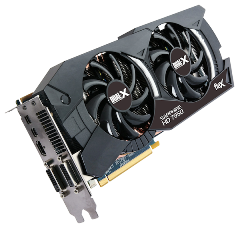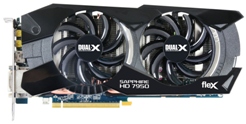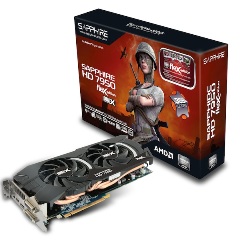
SAPPHIRE Technology ha appena annunciato la scheda SAPPHIRE HD 7950 Flex Edition che aggiunge la propria esclusiva soluzione di gaming multischermo a uno dei modelli di punta della serie di schede grafiche HD 7000 basate sull'architettura grafica GCN (Graphics Core Next) di AMD.
La maggior parte delle schede grafiche basate sulla tecnologia AMD richiedono per la connessione del terzo monitor in configurazione Eyefinity sia un monitor DisplayPort o connesso ad un adattatore DisplayPort attivo. Le schede della famiglia SAPPHIRE FleX supportano tre monitor DVI in modalità Eyefinity e forniscono una vera area di lavoro SLS (Single Large Surface) senza la necessità di adattatori attivi. I primi due monitor sono connessi alle due porte DVI e il terzo alla HDMI, dotata di serie, se necessario, di un adattatore HDMI / DVI, senza necessità di alcun hardware supplementare.
SAPPHIRE HD 7950 FleX è la nuova scheda grafica altamente performante con questa caratteristica, che consente agli appassionati gamer di usare monitor DVI economici per tutti e tre i monitor. Alla configurazione è possibile aggiungere altri monitor che dovranno essere connessi alle uscite DisplayPort.
Grazie alla frequenza di clock di 860 MHz per il core e di 1250 MHz (5 Gb/sec effettivi) per la memoria, questo modello è più veloce della versione HD 7950 standard edition e offre un'esperienza di gioco multi-schermo di semplice configurazione anche per i giocatori più incalliti.
Per gli appassionati delle massime prestazioni, una nuova versione del tool di overclocking di SAPPHIRE TriXX, che supporta l'ultima generazione della tecnologia, è disponibile per il download gratuito dal sito web di SAPPHIRE. TriXX consente la regolazione della tensione della GPU e le velocità di clock del core e di memoria, con la visualizzazione continua della temperatura. La scheda supporta il controllo manuale della velocità della ventola, con la creazione di profili ventola utenti e la funzionalità che consente di salvare fino a quattro diverse configurazioni di prestazione.
La serie HD 7000 è la terza generazione di soluzioni compatibili con DirectX 11 prodotte dalla divisione grafica di AMD, la precedente ATI. La scheda SAPPHIRE HD 7950 è predisposta per DirectX 11.1 e per il nuovo sistema operativo Windows 8; è inoltre in grado di fornire funzionalità DirectX 11 complete tra cui DirectCompute11 e la comunicazione multiprocesso con la CPU. La comunicazione con il PC host è ottimizzata tramite l'implementazione della più recente interfaccia ad alta velocità PCI-Express Gen3.0, mentre per incrementare ulteriormente la prestazione è possibile usare più schede in modalità CrossFireX con scheda madre dalle specifiche idonee.
Anche le specifiche HDMI sono incrementate nella serie HD 7000. Fast HDMI 1.4a supporta la funzionalità Stereoscopic 3D con velocità di frame ottimizzate di 60Hz per occhio, per un totale di 120Hz. La scheda è predisposta anche per la nuova generazione di monitor da 4K che possono essere gestiti da un singolo ingresso ad alta velocità della porta 3Ghz HDMI 1.4a o DisplayPort 1.2 HBR2.

[Immagine ad alta risoluzione]

[Immagine ad alta risoluzione]

[Immagine ad alta risoluzione]

SAPPHIRE Technology has just announced the SAPPHIRE HD 7950 Flex Edition brining the company's unique solution for multi-screen gaming to the highly acclaimed HD 7000 series of graphics cards based on the Graphics Core Next architecture from AMD.
Most graphics cards based on AMD technology require the third monitor in an Eyefinity set-up to be a DisplayPort monitor, or connected with an active DisplayPort Adapter. The SAPPHIRE FleX family can support three DVI monitors in Eyefinity mode and deliver a true SLS (Single Large Surface) work area without the need for active adapters. The first two monitors are connected to the two DVI ports and the third to an HDMI to DVI cable (supplied) with no extra hardware required.
The SAPPHIRE HD 7950 FleX is now the highest performing card with this feature, allowing gamers to use low-cost DVI monitors for all three screens. Additional monitors can be added to the setup, but must be DisplayPort connected. With its core clock speeds of 860 MHz and 1250 MHz (5 Gb/sec effective) for the memory this model is slightly faster than the HD 7950 standard edition and brings easy to configure multi-screen enjoyment to even hard-core gamers.
For enthusiasts wishing to maximise performance, a new version of the SAPPHIRE overclocking tool, TriXX supporting this latest generation of technology is available free to download from the SAPPHIRE website. TriXX allows tuning of GPU voltage as well as core and memory clocks, whilst continuously displaying temperature. Manual control of fan speed is supported, as well as user created fan profiles and the ability to save up to four different performance settings.
The HD 7000 series is the third generation of DirectX 11 compatible solutions from the graphics division of AMD - formerly ATI. The SAPPHIRE HD 7950 is ready for DirectX 11.1 and the new Windows 8 operating system as well as delivering all the features of the current DirectX 11 such as DirectCompute11 and multi threaded communications with the CPU. Communication with the host PC is optimised with the implementation of the latest high speed PCI-Express Gen3.0 interface, and multiple cards can be used to further enhance performance in CrossFireX mode on a suitably specified mainboard.
HDMI specifications have also increased in the HD 7000 series. Fast HDMI 1.4a supports Stereoscopic 3D with enhanced frame rates of 60 Hz per eye - 120 Hz total. It is also ready for the next generation of 4K displays that can be driven from a single high speed input of 3 GHz HDMI 1.4a or DisplayPort 1.2 HBR2.
APP Acceleration is the name given to the enhanced performance of a wide range of applications using the stream processing capabilities and specific hardware features of the graphics architecture. The HD 7000 series has been optimised for this type of task. Typical applications include Video encoding and decoding, compression and multiplexing for media distribution, gaming or video conferencing. APP acceleration can also enhance everyday tasks such as Internet browsing, Office applications and file compression with supported software suites.
Source: SAPPHIRE Technology Press Release
Links



